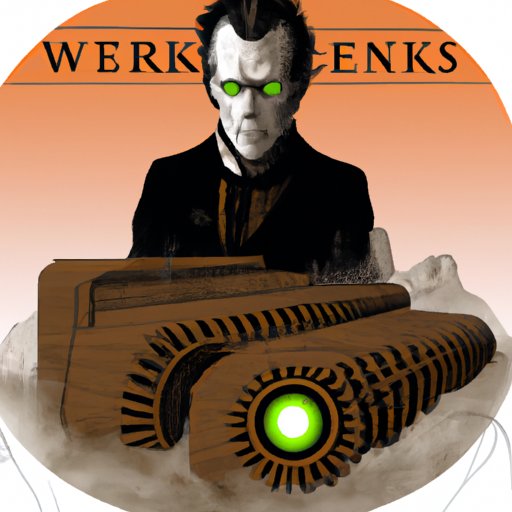Introduction
Science fiction is a genre of literature that uses scientific concepts and technologies to explore imaginative worlds and stories. It often contains elements of speculative fiction, which can include elements of fantasy, horror, and alternative history. Mary Shelley’s novel Frankenstein is one of the most famous works of science fiction ever written, but what makes it a science fiction novel? This article will explore Frankenstein, its themes, and its place in science fiction.

Analyzing the Themes of Frankenstein and Its Place in Science Fiction
One of the main themes explored in Frankenstein is nature vs. technology. The novel follows Victor Frankenstein’s attempt to create life using science and technology. He creates a living being out of lifeless material, which goes against the “natural” order of things. Frankenstein’s creation is a monster, which raises questions about the consequences of tampering with nature. In this way, the novel serves as both a warning and an exploration of the potential of science and technology.
Another theme explored in the novel is monstrosity and human nature. Frankenstein’s creature is initially seen as a monster, but as the story progresses, readers begin to sympathize with him. His monstrous nature is not entirely his fault; he is rejected by society and treated cruelly. He eventually turns to violence as a result of his suffering, raising questions about how humans should treat those who are different from them. These themes are still relevant today, making Frankenstein a timeless work of science fiction.
The novel also examines the concept of the “modern Prometheus”, referring to the Greek myth of Prometheus, who stole fire from the gods and gave it to humanity. In the same way, Victor Frankenstein steals the power of life from God and gives it to his creation. This comparison serves as a warning about the dangers of playing God and tampering with natural laws.

Exploring the Role of Science in Frankenstein
Victor Frankenstein’s use of science plays a major role in the novel. He studies books on chemistry and anatomy in order to gain the knowledge he needs to create life. He also experiments with electricity in order to bring his creature to life. His experiments are dangerous and reckless, and ultimately lead to his own downfall. The novel serves as a cautionary tale for scientists, warning against the pursuit of knowledge without the proper respect or understanding of its power.
The novel also examines the impact of science on Frankenstein’s creation. The creature is an amalgamation of parts taken from various cadavers, so he is not truly alive. He is a “thing” created by science and lacks any real identity or purpose. He is rejected by society and eventually turns to violence as a way of expressing himself. This serves as a warning about the potential consequences of scientific progress.
Examining Frankenstein as a Cautionary Tale for Scientists
Frankenstein serves as a cautionary tale for scientists, warning against the pursuit of knowledge without the proper respect or understanding of its power. The novel suggests that science should be used responsibly, with consideration for its potential consequences. Victor Frankenstein pays the ultimate price for his hubris and disregard for morality, and his story serves as a warning to other scientists about the dangers of playing God.
The novel also examines the ethical implications of modern science. Victor Frankenstein is able to create life, but he does not take responsibility for his actions. He abandons his creature and refuses to accept it as his own, leading to tragic consequences. This serves as a warning about the need for scientists to consider the ethical implications of their work before engaging in it.

Comparing Frankenstein to Other Works of Science Fiction
Frankenstein has had a profound influence on the genre of science fiction. Many authors have been inspired by Shelley’s novel and have used it as a basis for their own works. One of the most famous examples is H.G. Wells’ War of the Worlds, which borrows heavily from Frankenstein in its exploration of science gone wrong and the potential consequences of unchecked scientific progress.
Shelley’s novel has also had an influence on many later science fiction authors, such as Isaac Asimov and Ray Bradbury. They have all drawn inspiration from Shelley’s themes and ideas, incorporating them into their own works. Frankenstein remains one of the most influential works of science fiction ever written.
Investigating Mary Shelley’s Influences on Frankenstein and Science Fiction
Mary Shelley was a well-read author who drew inspiration from many sources when writing Frankenstein. She was influenced by the works of John Milton, William Shakespeare, and Edmund Burke, as well as the writings of the German philosopher Johann Wolfgang von Goethe. Her reading of these authors informed her writing and gave her the tools to create a unique and powerful work of science fiction.
Shelley was also influenced by the scientific advances of her time. She was particularly interested in the work of Italian anatomist Luigi Galvani and his experiments with electricity. His experiments, combined with Shelley’s vivid imagination, led to the creation of Frankenstein’s creature.
Conclusion
In conclusion, Mary Shelley’s novel Frankenstein is a classic work of science fiction. It explores themes such as nature vs. technology, monstrosity and human nature, and the role of science in creating Frankenstein’s creature. The novel serves as a cautionary tale for scientists, warning against the pursuit of knowledge without the proper respect or understanding of its power. Additionally, Shelley’s novel has had a profound influence on the genre of science fiction, inspiring many later authors and works. Frankenstein remains one of the most influential works of science fiction ever written, and its legacy continues to live on.
(Note: Is this article not meeting your expectations? Do you have knowledge or insights to share? Unlock new opportunities and expand your reach by joining our authors team. Click Registration to join us and share your expertise with our readers.)
